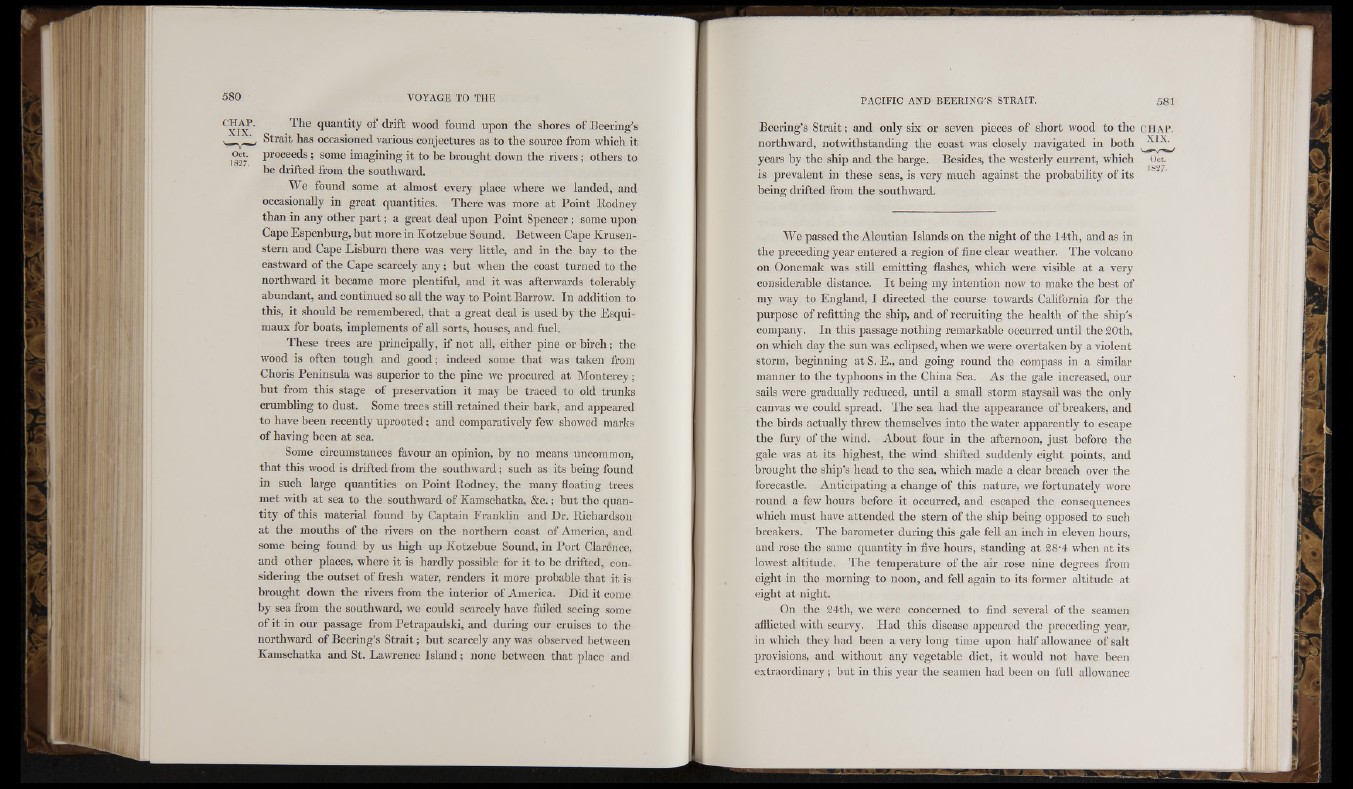
r i
The quantity of drift wood found upon the shores of Beering’s
Strait has occasioned various conjectures as to the source from which it
proceeds; some imagining it to be brought down the rivers; others to
be drifted from the southward.
AVe found some at almost every place where we landed, and
occasionally in great quantities. There was more at Point Rodney
than in any other part; a great deal upon Point Spencer ; some upon
Cape Espenburg, but more in Kotzebue Sound. Between Cape Krusenstern
and Cape Lisburn there was very little, and in the bay to the
eastward of the Cape scarcely any; but w'hen the coast turned to the
northward it became more plentiful, and it was afterwards tolerably
abundant, and continued so all the way to Point Barrow. In addition to
this, it should be remembered, that a great deal is used by the Esquimaux
for boats, implements of aU sorts, houses, and fuel.
These trees are principally, if not all, either pine or birch; the
wood is often tough and good; indeed some that was taken from
Choris Peninsula was superior to the pine we procured at Monterey;
but from this stage of preservation it may be traced to old trunks
crumbhng to dust. Some trees stiU retained their bark, and appeared
to have been recently uprooted; and comparatively few showed marks
of having been at sea.
Some circumstances favour an opinion, by no means uncommon,
that this wood is drifted from the southward; such as its being found
in such large quantities on Point Rodney, the many floating trees
met with at sea to the southward of Kamsehatka, &c.; but the quantity
of this material found by Captain Franklin and Dr. Richardson
at the mouths of the rivers on the northern coast of America, and
some being found by us high up Kotzebue Sound, in Port Clarence,
and other places, where it is hardly possible for it to be drifted, considering
the outset of fresh water, renders it more probable that it is
brought down the rivers from the interior of America. Did it come
by sea from the southward, we could scarcely have failed seeing some
of it in our passage from Petrapaulski, and during our cruises to the
northward of Beering’s Strait; but scarcely any was observed between
Kamsehatka and St. Lawrence Island; none between that place and
■
Beering’s Strait; and only six or seven pieces of short wood to the C H A P ,
northward, notwithstanding the coast was closely navigated in both
years by the ship and the barge. Besides, the westerly current, which Oct.
is prevalent in these seas, is very much against the probability of its
being drifted from the southward.
AVe passed the Aleutian Islands on the night of the 14th, and as in
the preceding year entered a region of fine clear weather. The volcano
on Oonemak was stiU emitting flashes, which were visible at a very
considerable distance. It being my intention now to make the best of
my way to England, I directed the course towards California for the
purpose of refitting the ship, and of recruiting the health of the ship’s
company. In this passage nothing remarkable occurred until the SOth,
on which day the sun was eclipsed, when we were overtaken by a violent
storm, beginning a tS .E ., and going round the compass in a similar
manner to the typhoons in the China Sea. As the gale increased, our
sails were gradually reduced, until a small storm staysail was the only
canvas we could spread. ’The sea had the appearance of breakers, and
the birds actually threw themselves into the water apparently to escape
the fury ofth e wind. About four in the afternoon, just before the
gale was at its highest, the wind shifted suddenly eight points, and
brought the ship’s head to the sea, which made a clear breach over the
forecastle. Anticipating a change of this nature, ive fortunately wore
round a few hours before it occurred, and escaped the consequences
ivhich must have attended the stern of the ship being opposed to such
breakei'S. The barometer during this gale fell an inch in eleven hours,
and rose the same quantity in five hours, standing at 28-4 when at its
lowest altitude, 'ihe temperature ofth e air rose nine degrees from
eight in the morning to noon, and fell again to its former altitude at
eight at uight.
On the 24th, we were concerned to find several of the seamen
afflicted with scurvy. Had this disease appeared the preceding year,
in ivhich they had been a very long time upon half allowance of salt
provisions, and without any vegetable diet, it would not have been
extraordinary; but in this year the seamen had been on full allowance